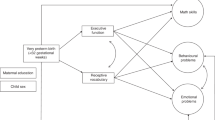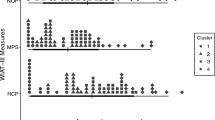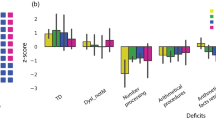Abstract
Background:
Children born very preterm (<32 wk) are at high risk for mathematics learning difficulties that are out of proportion to other academic and cognitive deficits. However, the etiology of mathematics difficulties in very preterm children is unknown. We sought to identify the nature and origins of preterm children’s mathematics difficulties.
Methods:
One hundred and fifteen very preterm children aged 8–10 y were assessed in school with a control group of 77 term-born classmates. Achievement in mathematics, working memory, visuospatial processing, inhibition, and processing speed were assessed using standardized tests. Numerical representations and specific mathematics skills were assessed using experimental tests.
Results:
Very preterm children had significantly poorer mathematics achievement, working memory, and visuospatial skills than term-born controls. Although preterm children had poorer performance in specific mathematics skills, there was no evidence of imprecise numerical representations. Difficulties in mathematics were associated with deficits in visuospatial processing and working memory.
Conclusion:
Mathematics difficulties in very preterm children are associated with deficits in working memory and visuospatial processing not numerical representations. Thus, very preterm children’s mathematics difficulties are different in nature from those of children with developmental dyscalculia. Interventions targeting general cognitive problems, rather than numerical representations, may improve very preterm children's mathematics achievement.
Similar content being viewed by others
Log in or create a free account to read this content
Gain free access to this article, as well as selected content from this journal and more on nature.com
or
References
MacKay DF, Smith GC, Dobbie R, Pell JP . Gestational age at delivery and special educational need: retrospective cohort study of 407,503 school children. PLoS Med 2010;7:e1000289.
Bhutta AT, Cleves MA, Casey PH, Cradock MM, Anand KJ . Cognitive and behavioral outcomes of school-aged children who were born preterm: a meta-analysis. JAMA 2002;288:728–37.
Simms V, Cragg L, Gilmore C, Marlow N, Johnson S . Mathematics difficulties in children born very preterm: current research and future directions. Arch Dis Child Fetal Neonatal Ed 2013;98:F457–63.
Cragg L, Gilmore C . Skills underlying mathematics: the role of executive function in the development of mathematics proficiency. Trends Neurosci Educ 2014;3:63–8.
Raghubar KP, Barnes MA, Hecht SA . Working memory and mathematics: a review of developmental, individual difference, and cognitive approaches. Learn Individ Differ 2010;20:110–22.
Gilmore C, Attridge N, Clayton S, et al. Individual differences in inhibitory control, not non-verbal number acuity, correlate with mathematics achievement. PLoS One 2013;8:e67374.
Assel MA, Landry SH, Swank P, Smith KE, Steelman LM . Precursors to mathematical skills: Examining the roles of visual-spatial skills, executive processes, and parenting factors. Appl Dev Sci 2003;7:27–38.
van der Sluis S, de Jong PF, van der Leij A . Executive functioning in children, and its relations with reasoning, reading, and arithmetic. Intelligence 2007;35:427–49.
Cowan R, Donlan C, Shepherd DL, Cole-Fletcher R, Saxton M, Hurry J . Basic calculation proficiency and mathematics achievement in elementary school children. J Educ Psychol 2011;103:786–803.
Muldoon K, Towse J, Simms V, Perra O, Menzies V . A longitudinal analysis of estimation, counting skills, and mathematical ability across the first school year. Dev Psychol 2013;49:250–7.
Geary D, Brown S . Cognitive addition: strategy choice and speed-of-processing differences in gifted, normal, and mathematically disabled children. Dev Psychol 1991;27:398–406.
Jordan NC, Hanich LB, Kaplan D . Arithmetic fact mastery in young children: a longitudinal investigation. J Exp Child Psychol 2003;85:103–19.
De Smedt B, Noel MP, Gilmore C, Ansari D . The relationship between symbolic and non-symbolic numerical magnitude processing and the typical and atypical development of mathematics: evidence from brain and behavior. Trends Neurosci Educ 2013;2:48–55.
Mazzocco MM, Feigenson L, Halberda J . Impaired acuity of the approximate number system underlies mathematical learning disability (dyscalculia). Child Dev 2011;82:1224–37.
Isaacs EB, Edmonds CJ, Lucas A, Gadian DG . Calculation difficulties in children of very low birthweight: a neural correlate. Brain 2001;124(Pt 9):1701–7.
Guarini A, Sansavini A, Giovanelli G, et al. Basic numerical processes in preterms. World J Pediatr 2006;2:102–8.
Hellgren K, Halberda J, Forsman L, Adén U, Libertus M . Compromised approximate number system acuity in extremely preterm school-aged children. Dev Med Child Neurol 2013;55:1109–14.
Guarini A, Sansavini A, Fabbri M, Alessandroni R, Faldella G, Karmiloff-Smith A . Basic numerical processes in very preterm children: a critical transition from preschool to school age. Early Hum Dev 2014;90:103–11.
Simms V, Gilmore C, Cragg L, Marlow N, Wolke D, Johnson S . Mathematics difficulties in extremely preterm children: evidence of a specific deficit in basic mathematics processing. Pediatr Res 2013;73:236–44.
Lad M . The English Indices of Deprivation, 2011. https://www.gov.uk/government/publications/english-indices-of-deprivation-2010.
Taylor HG, Espy KA, Anderson PJ . Mathematics deficiencies in children with very low birth weight or very preterm birth. Dev Disabil Res Rev 2009;15:52–9.
Price GR, Holloway I, Räsänen P, Vesterinen M, Ansari D . Impaired parietal magnitude processing in developmental dyscalculia. Curr Biol 2007;17:R1042–3.
Volpe JJ . Brain injury in premature infants: a complex amalgam of destructive and developmental disturbances. Lancet Neurol 2009;8:110–24.
Jaekel J, Wolke D . Preterm birth and dyscalculia. J Pediatr 2014;164:1327–32.
Litt JS, Gerry Taylor H, Margevicius S, Schluchter M, Andreias L, Hack M . Academic achievement of adolescents born with extremely low birth weight. Acta Paediatr 2012;101:1240–5.
Aarnoudse-Moens CS, Smidts DP, Oosterlaan J, Duivenvoorden HJ, Weisglas-Kuperus N . Executive function in very preterm children at early school age. J Abnorm Child Psychol 2009;37:981–93.
Rose SA, Feldman JF, Jankowski JJ . Modeling a cascade of effects: the role of speed and executive functioning in preterm/full-term differences in academic achievement. Dev Sci 2011;14:1161–75.
Special Educational Needs: Code of Practice. London, UK: Department for Education and Skills, 2001.
Dowker A . What Works for Children With Mathematical Difficulties? Nottingham, UK: Department for Children, Schools and Families, 2009.
Melby-Lervåg M, Hulme C . Is working memory training effective? A meta-analytic review. Dev Psychol 2013;49:270–91.
Grunewaldt KH, Løhaugen GC, Austeng D, Brubakk AM, Skranes J . Working memory training improves cognitive function in VLBW preschoolers. Pediatrics 2013;131:e747–54.
von Aster MG, Shalev RS . Number development and developmental dyscalculia. Dev Med Child Neurol 2007;49:868–73.
Mulder H, Pitchford NJ, Marlow N . Processing speed and working memory underlie academic attainment in very preterm children. Arch Dis Child Fetal Neonatal Ed 2010;95:F267–72.
March of Dimes, Partnership for Maternal, Newborn and Child Health, Save the Children, World Health Organisation. Born Too Soon: The Global Action Report on Preterm Birth. Howson CP, Kinney MV, Lawn JE, eds. Geneva, Switzerland: WHO, 2012.
Moore T, Hennessy E, Myles J, et al. Neurological and developmental outcome in extremely preterm children born in England in 1995 and 2006: The EPICure studies. Br Med J 2012;345:e7961.
Crawford C, Cribb J . Reading and maths skills at age 10 and earnings in later life: A brief analysis using the British cohort study. (Report No. 3). UK: Centre for Analysis of Youth Transitions, 2013.
Johnson S, Wolke D, Hennessy E, Marlow N . Educational outcomes in extremely preterm children: neuropsychological correlates and predictors of attainment. Dev Neuropsychol 2011;36:74–95.
Office for National Statistics. The national statistics socio-economic classification user manual, 2005. http://www.ons.gov.uk/ons/guide-method/classifications/current-standard-classifications/soc2010/soc2010-volume-3-ns-sec--rebased-on-soc2010--user-manual/index.html.
Author information
Authors and Affiliations
Corresponding author
PowerPoint slides
Rights and permissions
About this article
Cite this article
Simms, V., Gilmore, C., Cragg, L. et al. Nature and origins of mathematics difficulties in very preterm children: a different etiology than developmental dyscalculia. Pediatr Res 77, 389–395 (2015). https://doi.org/10.1038/pr.2014.184
Received:
Accepted:
Published:
Issue date:
DOI: https://doi.org/10.1038/pr.2014.184
This article is cited by
-
Visuospatial working memory of children and adults born very preterm and/or very low birth weight
Pediatric Research (2022)
-
Multi-domain cognitive impairments at school age in very preterm-born children compared to term-born peers
BMC Pediatrics (2021)
-
Preterm children’s long-term academic performance after adaptive computerized training: an efficacy and process analysis of a randomized controlled trial
Pediatric Research (2021)
-
Developmental Disorders Among Very Preterm Children
Current Developmental Disorders Reports (2018)
-
The association of children’s mathematic abilities with both adults’ cognitive abilities and intrinsic fronto-parietal networks is altered in preterm-born individuals
Brain Structure and Function (2017)



